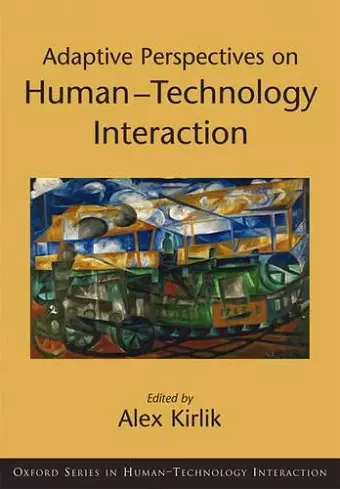Adaptive Perspectives on Human-Technology Interaction
Methods and Models for Cognitive Engineering and Human-Computer Interaction
Format:Hardback
Publisher:Oxford University Press Inc
Published:18th May '06
Currently unavailable, and unfortunately no date known when it will be back
This hardback is available in another edition too:
- Paperback£49.49(9780195374827)

In everyday life, and particularly in the modern workplace, information technology and automation increasingly mediate, augment, and sometimes even interfere with how humans interact with their environment. How to understand and support cognition in human-technology interaction is both a practically and socially relevant problem. The chapters in this volume frame this problem in adaptive terms: how are behaviour and cognition adapted, or perhaps ill-adapted, to the demands and opportunities of an environment where interaction is mediated by tools and technology? The authors draw heavily on the work of Egon Brunswik, a pioneer in ecological and cognitive psychology, as well as on modern refinements and extensions of Brunswikian ideas, including Hammond's Social Judgment Theory, Gigerenzer's Ecological Rationality and Anderson's Rational Analysis. Inspired by Brunswik's view of cognition as "coming to terms" with the "causal texture" of the external world, the chapters in this volume provide quantitative and computational models and measures for studying how people come to terms with an increasingly technological ecology, and provide insights for supporting cognition and performance through design, training, and other interventions. The methods, models, and measures presented in this book provide timely and important resources for addressing problems in the rapidly growing field of human-technology interaction.
". . . Not only does Brunswik's analysis provide a coherent way to think about the problems of perception, mind, environment, and adaptation, but in a sense, Brunswik gets the last theoretical laugh in one of psychology's oldest arguments. The book is an indispensable guide to an emerging theoretical consensus on embedded human-machine systems." --Stuart Card, Senior Research Fellow, Xerox PARC
". . . The book is a tour de force that demonstrates the broad applicability of the Brunswikian tradition, captures a very wide range of domains, and introduces substantial advances in both theory and methodology. Although I have not been steeped in this tradition, I came away with a deep respect for what it can add to our perspectives and to our armamentarium of research and development tools." --Richard W. Pew, Principal Scientist, BBN Technologies
". . . First rate authors applying models of human judgment to design of complex automated systems." --Thomas B. Sheridan, Ford Professor of Engineering and Applied Psychology Emeritus, Massachusetts Institute of Technology
"This is a very fine book that shows how the ideas of Brunswik can be applied to understanding the interface between cognition and technology. Brunswik's seminal ideas have not gotten the recognition they deserve, and this book helps remind us all of just how important they are." --Robert J. Sternberg, IBM Professor of Psychology and Education, Professor of Management, and Director of the Center for the Psychology of Abilities, Competencies, and, Expertise (PACE Center), Yale University
ISBN: 9780195171822
Dimensions: 180mm x 254mm x 28mm
Weight: 816g
336 pages